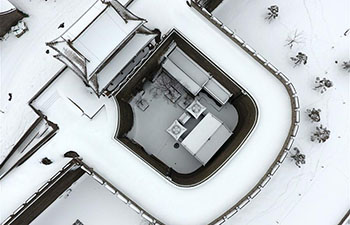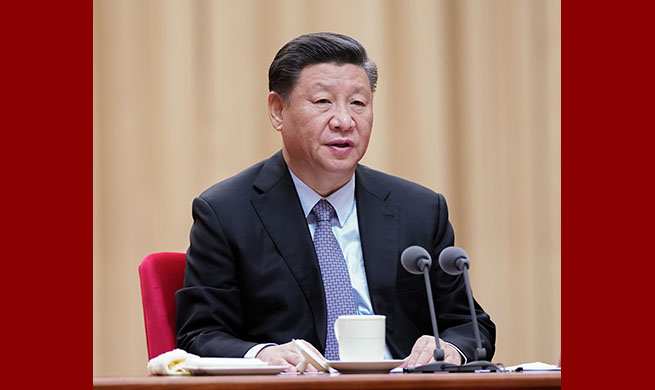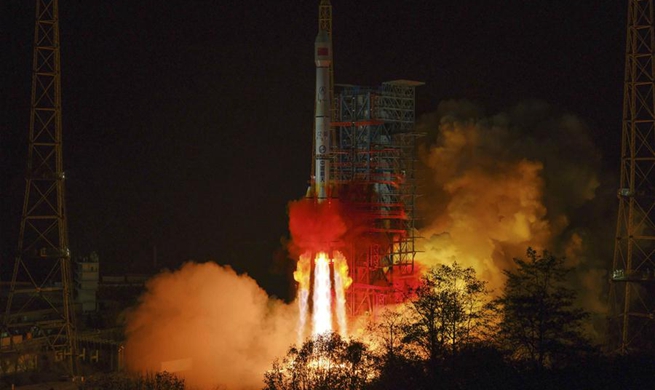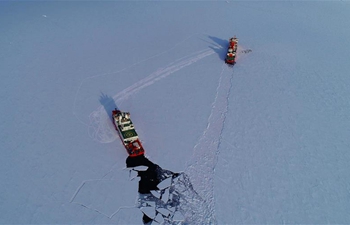BAGHDAD, Jan. 8 (Xinhua) -- The Iranian missile attack on the military bases housing U.S. troops in Iraq on Wednesday will drag Baghdad deeper into the growing conflict between Tehran and Washington which also threatens to spill over to the entire Middle East region.
Abdullah al-Jubouri, an Iraqi expert told Xinhua that the conflict between the United States and Iran on the Iraqi soil has become a fact, and the biggest loser is Iraq.
"Iraq is in the cross-fire of the two foes (Iran and the U.S.), and obviously Iraq has failed to bring its two close friends together," said al-Jubouri, a retired brigadier general in the former Iraqi army under Saddam Hussein.
The Iraqi leaders have repeatedly said they want to maintain balanced relations between Iran and the United States, trying to mediating between them to end the tension in the region.
However, Washington considers the decision of the Iraqi parliament to ask the government to end the presence of foreign forces in Iraq as siding with the Iran against it, al-Jubouri noted.
"The parliament's position toward the presence of foreign forces led the Iraqi government to lose its credibility of adopting the position of a fair mediator," the Iraqi expert concluded.
The reckless attacks between Iran and the United States would put great pressures on Iraq, which has already suffered deep political and popular division.
The lawmakers loyal to Shiite leading parties stand behind the parliamentary resolution that calls for ending the presence of foreign forces excluding the Kurds, while most of the Sunni lawmakers want withdrawal to include the Iranian militias.
Even the anti-government demonstrators in Baghdad and other Iraqi provinces are divided, as some of them reject any strike on Iraq, while protesters close to Shiite parties support Iranian strikes on U.S. forces.
Sabah al-Sheikh, a professor of politics at Baghdad University, told Xinhua that he blames the political system, which was built in 2003 on sectarian bases and the quota system, for producing weak governments.
"The weakness of the Iraqi government has encouraged the two conflicting powers to turn Iraq into their battlefield, and now all evidence indicates that the uncontrollable Iran-backed militias are preparing for more attacks in Iraq against the coalition forces as a sort of attrition war through Iran's proxy militias," al-Sheikh said.
He warned that such conflict could spill over outside Iraq and attract other players like Israel so as to threaten the entire Middle East.
There must be action by the international community to convince the Iran and the United States to go to dialogue and end their differences away from Iraq, al-Sheikh noted.
On Wednesday, Iran fired ballistic missiles before dawn on military bases housing U.S. troops in Iraq's western province of Anbar and near the city of Erbil, capital of the semi-autonomous region of Kurdistan.
Last week, a U.S. drone attacked a convoy near Baghdad International Airport, killing Qassem Soleimani, commander of the Quds Force of Iran's Islamic Revolution Guards Corps, and Abu Mahdi al-Muhandis, deputy chief of Iraq's paramilitary Hashd Shaabi forces.
On Jan. 5, the Iraqi parliament passed a resolution requiring the government to end the presence of foreign forces in Iraq and prevent them from using Iraqi airspace and waters.
More than 5,000 U.S. troops have been deployed in Iraq to support the Iraqi forces in the battles against Islamic State militants.

















